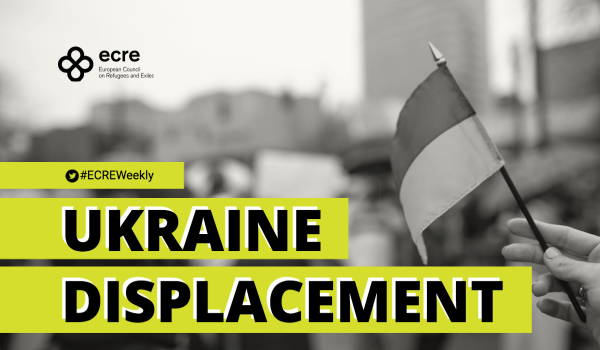More than three million Ukrainians have left the country, while some 2 million are internally displaced, according to the latest figures from the UN Refugee Agency (UNHCR). Concerns are growing over risks that Ukrainian women and children travelling across Europe being exposed to exploitation by traffickers. Frontex (the European Border and Coast Guard Agency) is assisting with returns of third country nationals fleeing Ukraine. Russians are also entering Europe in search of a safe haven and proposals have been floated to grant protection to defectors from the Russian army.
On 18 March, UNHCR tallied the number of refugees outside Ukraine at 3.27 million. Inside the country, some 2 million are internally displaced, and an additional 13 million are directly affected by the conflict. Countless local organisations are scaling up to respond to the humanitarian need. The International Committee of the Red Cross (ICRC) has highlighted the dire situation for “hundreds of thousands” of civilians trapped in Mariupol, who face “a worst-case scenario” if a humanitarian agreement is not found between the warring parties. UNHCR on 15 March said it had received “record-breaking” private donations of more than 200 million USD in two weeks towards its Ukraine emergency response. The Swiss justice minister on 11 March expressed her fears that displacement numbers across Ukrainian borders could soon reach as high as 15 million. This “highest number” estimate was said to represent roughly half the non-male population, given Ukrainian men face conscription.
UNHCR have expressed “worry” about the potential exploitation and abuse of people fleeing Ukraine. “Obviously all the refugees are women and children,” said UNHCR’s head of global communications, Joung-ah Ghedini-Williams: “You have to worry about any potential risks for trafficking — but also exploitation, and sexual exploitation and abuse. These are the kinds of situations that people like traffickers … look to take advantage of”. By 12 March, 70% of those arriving in Poland were estimated to stay with friends and relatives: a growing number however do not have accommodation options. Another vulnerable group are stateless persons. Ukraine’s last census – which dates back to 2001 – recorded 82,550 stateless people in the territory. This population comprises Roma people, former USSR citizens, Palestinians, Kuwaiti Bidoon, Syrian Kurds, as well as people living in Crimea and other non-government-controlled areas, inter alia. The European Network on Statelessness calls on the EU, European states, international agencies and NGOs to ensure that such people can access protection in line with international law.
On 11 March, Frontex said it was assisting with two charter flights to return roughly 400 people to Tajikistan and Kyrgyzstan who had fled Ukraine for the EU. The agency’s role in returning foreigners trapped in the EU due to the war in Ukraine encompasses renting planes and even buying tickets. The International Organization for Migration (IOM) also assisted 123 Azerbaijan nationals stranded in Poland to return to their country of origin on 13 March.
The EU and other Western states have been called upon to offer safe haven to Russians seeking to escape dwindling civil liberties under the Putin regime. Al Jazeera reports that an increasing number are crossing the land border to Finland, Latvia, Lithuania, and Estonia. Most however, do not have European visas, and travel to Georgia, Armenia and Turkey to join growing Russian dissident communities. Inside Russia, those accused of spreading “disinformation” about the “special military operation” risk prison sentences of up to 15 years. Russian officials threaten “very grave punishment” for dissent, and more than 14,000 have been arrested for attending anti-war marches. Further, on 16 March the Czech prime minister suggested that EU states offer refuge to Russian soldiers that choose to defect whilst serving in Ukraine. Polish MEP Radek Sikorski had previously argued that the EU should offer every defecting soldier a three-year work permit and a 3,000 euro payment. Ukraine meanwhile is offering “amnesty” and a payment of five million rubles (roughly 41,000 euro) to any Russian soldiers who surrender and turn over their weapons and equipment. It is not clear however if this is implemented in practice.
For further information:
- ECRE, EU Ukraine Response: EU Steps Up With Temporary Protection, Border Management Guidelines, Humanitarian Aid, and Support to Member States, March 2022
- ECRE, Ukrainian Borders: More Than Two Million Arrivals to Neighbouring States, Strong Community Response in Poland, Hungary Introduces Tougher Controls, Moldova Under Pressure, March 2022
This article appeared in the ECRE Weekly Bulletin. You can subscribe to the Weekly Bulletin here.

